Over the weekend, people became incredibly angry over this Dove body wash ad. A photo collage of the advertisement, compiled by @Naythemua, went massively viral. The ad begins with a model, Lola Ogunyemi, removing her shirt, revealing a white woman.
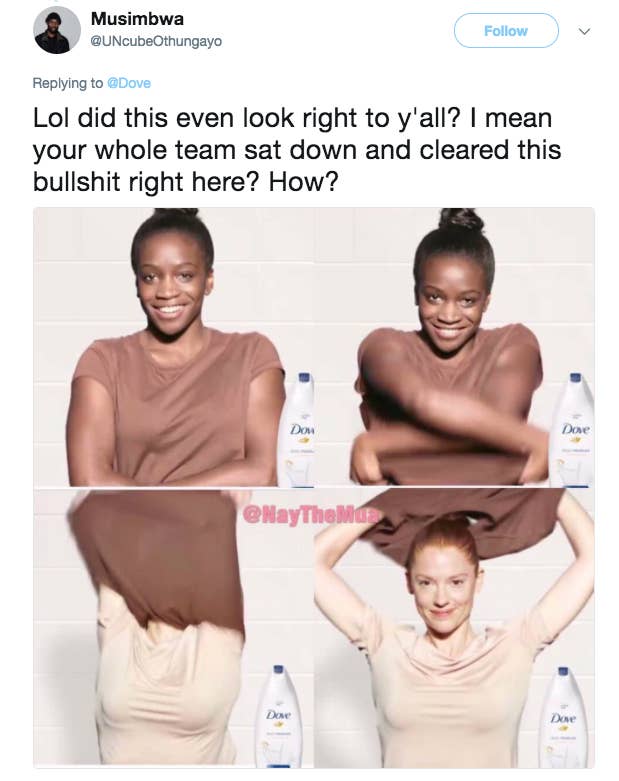
After the ad went viral, people called for a boycott of Dove products and compared the beauty company's advertising and product labels to historical examples of racism in soap advertising.
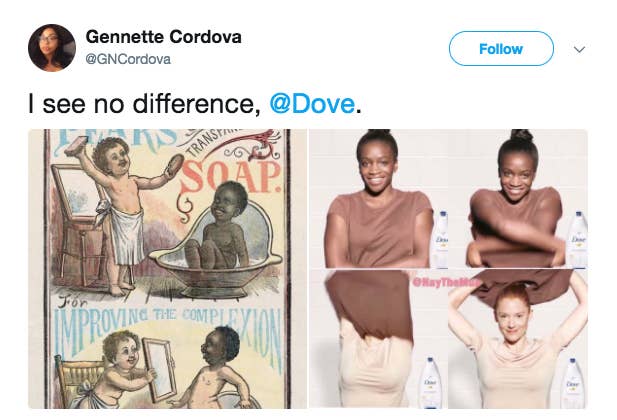
On Saturday, Dove apologized on Twitter for the ad. For many, the beauty company's statement was inadequate.
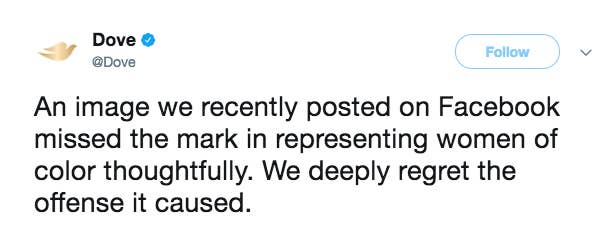
"What was the mark, @Dove?"
What was the mark, @Dove? 🤔
"Do better here," Ava DuVernay instructed.
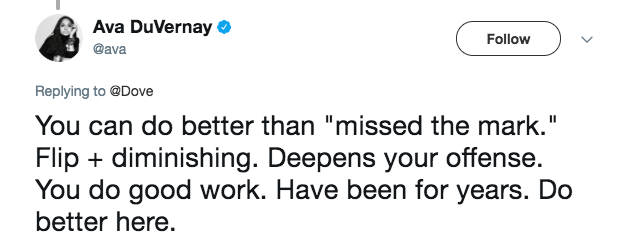
Dove provided a lengthier statement to BuzzFeed News on Sunday about the ad:
As a part of a campaign for Dove Body Wash, a 3-second video clip was posted to the US Facebook page. This did not represent the diversity of real beauty which is something Dove is passionate about and is core to our beliefs, and it should not have happened. We have removed the post and have not published any other related content. We apologize deeply and sincerely for the offense that it has caused and do not condone any activity or imagery that insults any audience.
The company also tweeted another apology on Monday, explaining the ad's intended message. "As a part of a campaign for Dove body wash, a 3-second video clip was posted to the US Facebook page which featured three women of different ethnicities, each removing a t-shirt to reveal the next woman," the statement read. "The short video was intended to convey that Dove body wash is for every woman and be a celebration of diversity, but we got it wrong."
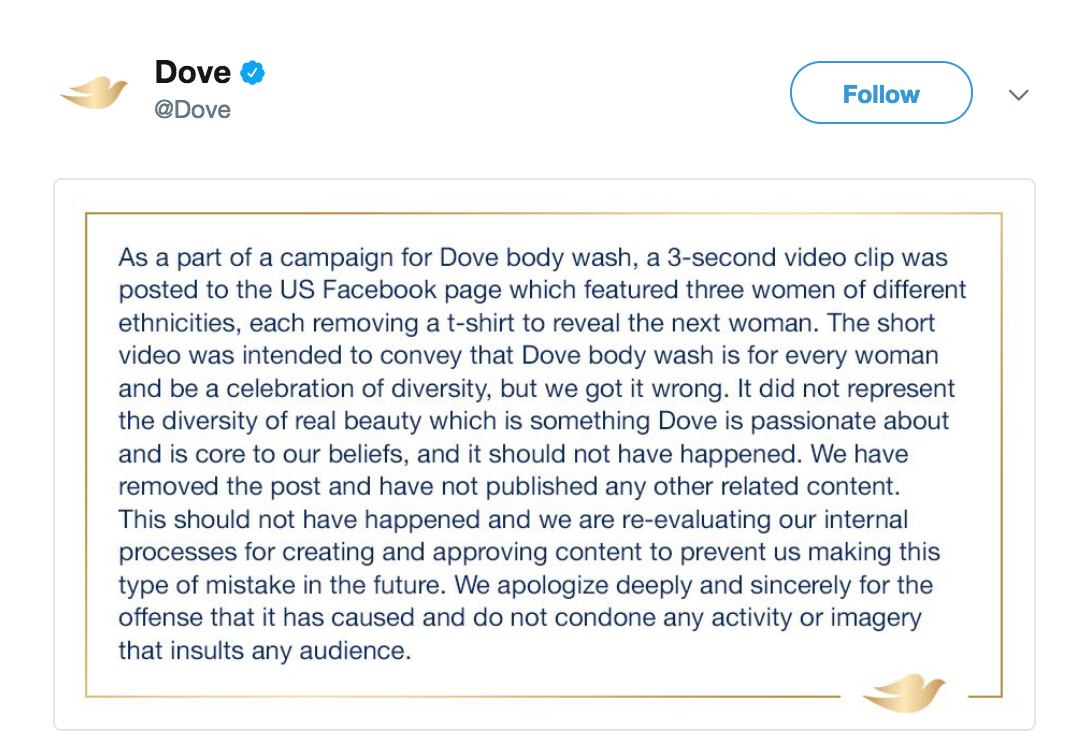
On Tuesday a model from the ad, Lola Ogunyemi, wrote an op-ed, published by The Guardian, addressing the backlash. In the beginning of the piece, Ogunyemi explains why she was so excited to participate in the Dove campaign:
From a very young age, I’ve been told, “You’re so pretty … for a dark-skinned girl.” I am a Nigerian woman, born in London and raised in Atlanta. I’ve grown up very aware of society’s opinion that dark-skinned people, especially women, would look better if our skin were lighter.
I know that the beauty industry has fueled this opinion with its long history of presenting lighter, mixed-race or white models as the beauty standard. Historically, and in many countries still today, darker models are even used to demonstrate a product’s skin-lightening qualities to help women reach this standard.
This repressive narrative is one I have seen affect women from many different communities I’ve been a part of. And this is why, when Dove offered me the chance to be the face of a new body wash campaign, I jumped.
She wrote that she found reaction to the ad "upsetting."
If you Google “racist ad” right now, a picture of my face is the first result. I had been excited to be a part of the commercial and promote the strength and beauty of my race, so for it to be met with widespread outrage was upsetting.
"If I had even the slightest inclination that I would be portrayed as inferior, or as the 'before' in a before and after shot, I would have been the first to say an emphatic 'no,'" she said later in the piece. She described her time with Dove as "amazing" and "positive."
If I had even the slightest inclination that I would be portrayed as inferior, or as the “before” in a before and after shot, I would have been the first to say an emphatic “no”. I would have (un)happily walked right off set and out of the door. That is something that goes against everything I stand for.
However, the experience I had with the Dove team was positive. I had an amazing time on set. All of the women in the shoot understood the concept and overarching objective – to use our differences to highlight the fact that all skin deserves gentleness.
She said that she admired both the "13-second video clip" Facebook ad and the "30-second TV commercial" for the body wash. She added that she believes the TV ad was more effective: "I think the full TV edit does a much better job of making the campaign’s message loud and clear," she wrote.
Then the first Facebook ad was released: a 13-second video clip featuring me, a white woman, and an Asian woman removing our nude tops and changing into each other. I loved it. My friends and family loved it. People congratulated me for being the first to appear, for looking fabulous, and for representing Black Girl Magic. I was proud.
Then, the full, 30-second TV commercial was released in the US, and I was over the moon again. There were seven of us in the full version, different races and ages, each of us answering the same question: “If your skin were a wash label, what would it say?”
At the end of the the op-ed, Ogunyemi says that she understands how the stills from the ad were "misinterpreted." She also said that: "The narrative has been written without giving consumers context on which to base an informed opinion." The op-ed ends with Ogunyemi saying: "I am not just some silent victim of a mistaken beauty campaign. I am strong, I am beautiful, and I will not be erased."
I can see how the snapshots that are circulating the web have been misinterpreted, considering the fact that Dove has faced a backlash in the past for the exact same issue. There is a lack of trust here, and I feel the public was justified in their initial outrage. Having said that, I can also see that a lot has been left out. The narrative has been written without giving consumers context on which to base an informed opinion.
While I agree with Dove’s response to unequivocally apologise for any offense caused, they could have also defended their creative vision, and their choice to include me, an unequivocally dark-skinned black woman, as a face of their campaign. I am not just some silent victim of a mistaken beauty campaign. I am strong, I am beautiful, and I will not be erased.
